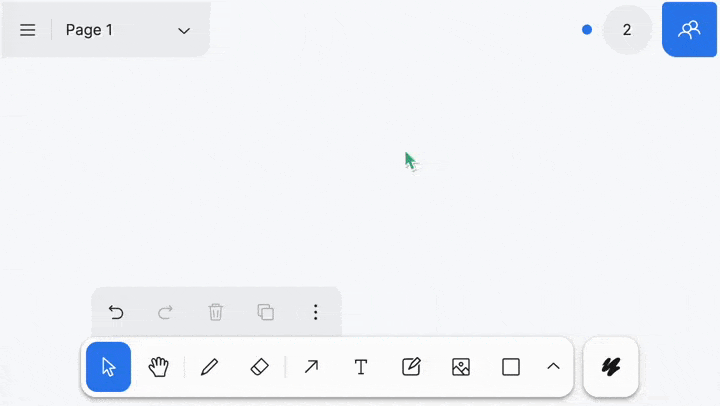This PR adds support for seeing **another user**'s chat messages. It's part 1 of two PRs relating to Cursor Chat. And it's needed for the much bigger part 2: https://github.com/tldraw/brivate/pull/1981 # Presence You can see another person's chat messages!  If they have a name, it gets popped on top.  That's it! With this PR, there's no way of actually *typing* your chat messages. That comes with the [next one](https://github.com/tldraw/brivate/pull/1981)! # Admin ### To-do - [x] Store chat message - [x] Allow overflowing chat - [x] Presence for chat message - [x] Display chat message to others ### Change Type - [x] `minor` — New Feature ### Test Plan To test this, I recommend checking out both `lu/cursor-chat` branches, and opening two browser sessions in the same shared project. 1. In one session, type some cursor chat by pressing the Enter key while on the canvas (and typing). 2. On the other session, check that you can see the chat message appear. 3. Repeat this while being both named, and unnamed. I recommend just focusing on the visible presense in this PR. The [other PR](https://github.com/tldraw/brivate/pull/1981) is where we can focus about how we _input_ the cursor chat. ### Release Notes - [dev] Added support for cursor chat presence. --------- Co-authored-by: Steve Ruiz <steveruizok@gmail.com> |
||
|---|---|---|
| .. | ||
| src | ||
| api-extractor.json | ||
| api-report.md | ||
| CHANGELOG.md | ||
| LICENSE | ||
| package.json | ||
| README.md | ||
| tsconfig.json | ||
@tldraw/tlschema
This package houses type definitions, schema migrations, and other type metadata for the tldraw editor's default persisted data.
There are three main kinds of types:
-
Record types
These are root record types added to the
Storeclass. They are defined in the./src/recordsdirectory. -
Shape types
These are subtypes of the root TLShape record type. They allow specifying a unique name and custom props for a particular kind of shape.
-
Asset types
These are subtypes of the root TLAsset record type. They allow specifying a unique name and custom props for a particular kind of asset.
Adding migrations
If you make any kind of change to any persisted data shape in this package, you must add migrations that are able to convert old versions to new versions, and vice-versa.
If you are making a change that affects the structure of a record, shape, or asset, update the migrations in the same file as the record, shape, or asset is defined.
If you are making a change that affects the structure of the store (e.g. renaming or deleting a type, consolidating two shape types into one, etc), add your changes in the migrations in schema.ts.
After making your changes, add a new version number, using a meaninful name. For example, if you add a new property
to the TLShape type called ownerId that points to a user, you might do this:
In TLShape.ts
const Versions = {
RemoveSomeProp: 1,
+ AddOwnerId: 2,
} as const
and then in the TLShape type
x: number
y: number
+ ownerId: ID<TLUser> | null
props: Props
parentId: ID<TLShape> | ID<TLPage>
and then adding a migration:
export const shapeTypeMigrations = defineMigrations({
currentVersion: Versions.Initial,
firstVersion: Versions.Initial,
migrators: {
+ [Versions.AddOwnerId]: {
+ // add ownerId property
+ up: (shape) => ({...shape, ownerId: null}),
+ // remove ownerId property
+ down: ({ownerId, ...shape}) => shape,
+ }
},
After you've added your migration, make sure to add a test for it in src/migrations.test.ts. It will complain if you do not!
License
The source code in this repository (as well as our 2.0+ distributions and releases) are currently licensed under Apache-2.0. These licenses are subject to change in our upcoming 2.0 release. If you are planning to use tldraw in a commercial product, please reach out at hello@tldraw.com.